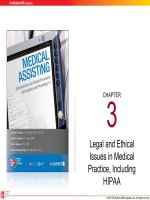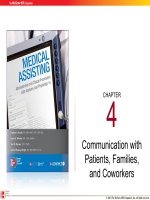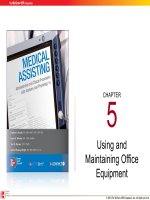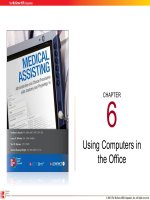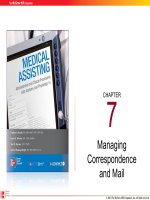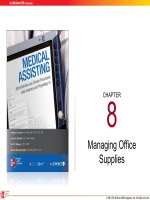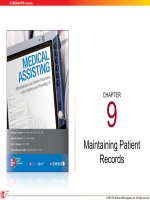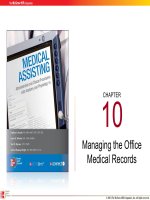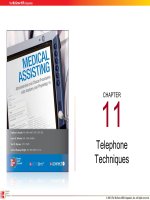Lecture Medical assisting: Administrative and clinical procedures with anatomy and physiology (4e) – Chapter 11
Bạn đang xem bản rút gọn của tài liệu. Xem và tải ngay bản đầy đủ của tài liệu tại đây (1.43 MB, 59 trang )
CHAPTER
11
Telephone
Techniques
© 2011 T he McGraw -Hill Com panie s, Inc. A ll rights reserv ed.
11-2
Learning Outcomes
11.1 Explain the importance of communication skills.
11.2 Explain how to manage incoming telephone calls.
11.3 Describe how the Health Insurance Portability and
Accountability Act (HIPAA) applies to telephone
communications.
11.4 Describe the procedure for calling a new
prescription or prescription renewal into a
pharmacy.
© 2011 T he McGraw -Hill Com panie s, Inc. A ll rights reserv ed.
11-3
Learning Outcomes (cont.)
11.5 Compare the types of calls the medical assistant
handles with those the physician or other staff
members handle.
11.6 Describe how to handle various types of incoming
calls from patients and from others.
11.7 Discuss the importance of proper telephone
etiquette.
11.8 Describe the procedures for taking telephone
messages.
© 2011 T he McGraw -Hill Com panie s, Inc. A ll rights reserv ed.
11-4
Learning Outcomes (cont.)
11.9 Explain how to retrieve calls from an answering
service.
11.10 Describe the procedures for placing outgoing
calls.
11.11 Explain the function of telephone triage in the
medical office.
11.12 Explain the uses of a facsimile machine in a
medical office.
© 2011 T he McGraw -Hill Com panie s, Inc. A ll rights reserv ed.
11-5
Introduction
• Telephone calls must be professionally
and effectively handled
• Telephone etiquette
– Common courtesy
– Proper pronunciation, tone, and
enunciation
• How to handle difficult situations and
complaints
• How to document messages
© 2011 T he McGraw -Hill Com panie s, Inc. A ll rights reserv ed.
11-6
Using the Telephone Effectively (cont.)
Good telephone techniques leave the patient with a
positive impression of
• You
• The physician
• The practice
Good telephone management
shows that the staff is
• Caring
• Attentive
• Helpful
Poor telephone
management results in
• Bad feelings
• Misunderstanding
• Unfavorable
impressions
© 2011 T he McGraw -Hill Com panie s, Inc. A ll rights reserv ed.
11-7
Communication Skills
• Using tact and sensitivity
• Showing empathy
• Giving respect
• Being genuine
© 2011 T he McGraw -Hill Com panie s, Inc. A ll rights reserv ed.
11-8
Communication Skills (cont.)
• Displaying openness and friendliness
• Refraining from passing judgment or
stereotyping
• Being supportive
• Asking for clarification and feedback
© 2011 T he McGraw -Hill Com panie s, Inc. A ll rights reserv ed.
11-9
Communication Skills (cont.)
• Paraphrasing to ensure
understanding
• Being receptive to the patient’s
needs
• Knowing when to speak and
when to listen
• Being willing to consider other
viewpoints
© 2011 T he McGraw -Hill Com panie s, Inc. A ll rights reserv ed.
11-10
Communication Skills (cont.)
The 5 Cs
of
Communication
© 2011 T he McGraw -Hill Com panie s, Inc. A ll rights reserv ed.
11-11
Apply Your Knowledge
1. What two things does proper telephone
management do?
ANSWER: Proper telephone management keeps
patients informed and ensures patient satisfaction.
© 2011 T he McGraw -Hill Com panie s, Inc. A ll rights reserv ed.
11-12
Apply Your Knowledge
2. What are the 5 Cs of communication and what
does each mean?
ANSWER: The 5 Cs of communication are:
• Completeness – the message must contain all needed
information
• Clarity – it should be legible and free from ambiguity
• Conciseness – it should be brief and direct
• Courtesy – it should be respectful and considerate
• Cohesiveness – it should be organized and logical
Certainly!
© 2011 T he McGraw -Hill Com panie s, Inc. A ll rights reserv ed.
11-13
Guidelines for Managing Incoming Calls
• Answer calls promptly
• Be able to take a message
• Greet the caller with the medical office name and
your name
• Identify the caller and demonstrate a willingness
to assist him or her
– If the caller does not give his or her name, ask for it
© 2011 T he McGraw -Hill Com panie s, Inc. A ll rights reserv ed.
11-14
Guidelines for Managing Incoming Calls (cont.)
• Be courteous, calm, and pleasant
• Identify the nature of the call
• Use the caller’s name when saying goodbye at
the end of the call
• Comply with HIPAA guidelines for confidentiality
of patient information
© 2011 T he McGraw -Hill Com panie s, Inc. A ll rights reserv ed.
11-15
Screening Calls
• Tips
– Find out who is calling
– Ask what the call is in reference to
• Helps to determine who can handle
the call
– Decide whether to put the call through
• Do not put through callers who refuse to identify
themselves
– Determine what to do if the call is personal
© 2011 T he McGraw -Hill Com panie s, Inc. A ll rights reserv ed.
11-16
Routing Calls
Generally, three types of calls are received in the office:
1) Administrative Issues
3) Clinical Issues
2) Emergency Calls
• Follow the office policy to determine calls that
should be
– Put through immediately
– Returned later
– Handled by another staff member other than the
physician
© 2011 T he McGraw -Hill Com panie s, Inc. A ll rights reserv ed.
11-17
Routing Calls (cont.)
• Calls handled by the medical assistant
– Appointments
– Billing inquiries
– Insurance questions
– Diagnostic reports
(lab and x-ray)
– General administrative
questions
– Reports from hospitals and
patients
– Referral requests
– Prescription renewals (if
previously approved by the
physician)
– Patient complaints
regarding administrative
issues
© 2011 T he McGraw -Hill Com panie s, Inc. A ll rights reserv ed.
11-18
Routing Calls (cont.)
• Calls requiring the doctor’s attention
– Emergency calls
– Calls from other physicians
– Patient requests regarding test results
– Patient requests to discuss their symptoms
– Requests for prescription renewals
– Personal calls
A routing list specifies who is responsible
for handling certain types of calls.
© 2011 T he McGraw -Hill Com panie s, Inc. A ll rights reserv ed.
11-19
Apply Your Knowledge
The medical assistant is just returning from lunch, and the office
telephone is ringing. When the medical assistant answers, the
caller interrupts her greeting and says, “No, do not put me on
hold again, I have been on hold for 10 minutes!” How should
the medical assistant respond to this caller?
ANSWER: The medical assistant should remain calm, allow the
caller to express his or her concerns, apologize for any
inconvenience, and inform the caller that you would like to help.
The MA should not attempt to shift the blame by telling the caller
that he or she was just returning from lunch and instead should
put effort into assisting the caller.
© 2011 T he McGraw -Hill Com panie s, Inc. A ll rights reserv ed.
11-20
Types of Incoming Calls
Calls from
Patients
Medical Assistant Role
Appointments
• Make or change appointments
Billing Inquiries
• Clarify bill or charges
• Help set up payment
arrangements if possible
Diagnostic Reports
• Document what information is
given to the patient
Questions about
Medications
• Get approval for renewals
• Answer questions about
medications
© 2011 T he McGraw -Hill Com panie s, Inc. A ll rights reserv ed.
11-21
Types of Incoming Calls (cont.)
Calls from
Patients
Medical Assistant Role
Reports of Symptoms • Listen carefully and document
• Schedule appointment as needed
Progress Reports
• Route follow-up calls to the
physician
• Document call in patient record
Requests for Advice
• Do not give any medical advice
Complaints
• Remain calm and listen carefully
• Apologize for any inconveniences
• Follow through to resolve issue
© 2011 T he McGraw -Hill Com panie s, Inc. A ll rights reserv ed.
11-22
Emergency Calls
• Must be routed to
the physician immediately
• Includes serious or life-threatening
conditions such as
• Severe
bleeding
• Drug reaction
• Injuries
• Poisoning
• Suicide attempts
• Severe burns
• Loss of consciousness
© 2011 T he McGraw -Hill Com panie s, Inc. A ll rights reserv ed.
11-23
Types of Incoming Calls (cont.)
• Never use office phone for personal calls
– Limit cell phone use to essential calls only
• HIPAA and confidentiality apply to telephone
calls
• Attorneys
– Follow office guidelines carefully
– Never release any patient information unless the
physician authorizes you to do so
© 2011 T he McGraw -Hill Com panie s, Inc. A ll rights reserv ed.
11-24
Types of Incoming Calls (cont.)
• Other physicians
– Route calls to the physician
– Do not disclose any patient
information
• Salespeople
– Request that information be
mailed to you about new products
– Pharmaceutical representatives may be seen by the
physician
• Conference calls
© 2011 T he McGraw -Hill Com panie s, Inc. A ll rights reserv ed.
11-25
Apply Your Knowledge
A medical assistant working in a large medical/surgical
practice answers the telephone. The caller states “Hi,
I’m Dr. X., did Dr. C. perform Mrs. A. W.’s surgery
yesterday?” How should the medical assistant respond?
ANSWER: The medical assistant should request that Dr. X hold
to speak with the physician. You may not disclose any
information concerning a patient, including whether or not patient
A.W. had surgery, even to a physician. In addition, this may not
really be Dr. X.
Excellent
© 2011 T he McGraw -Hill Com panie s, Inc. A ll rights reserv ed.

